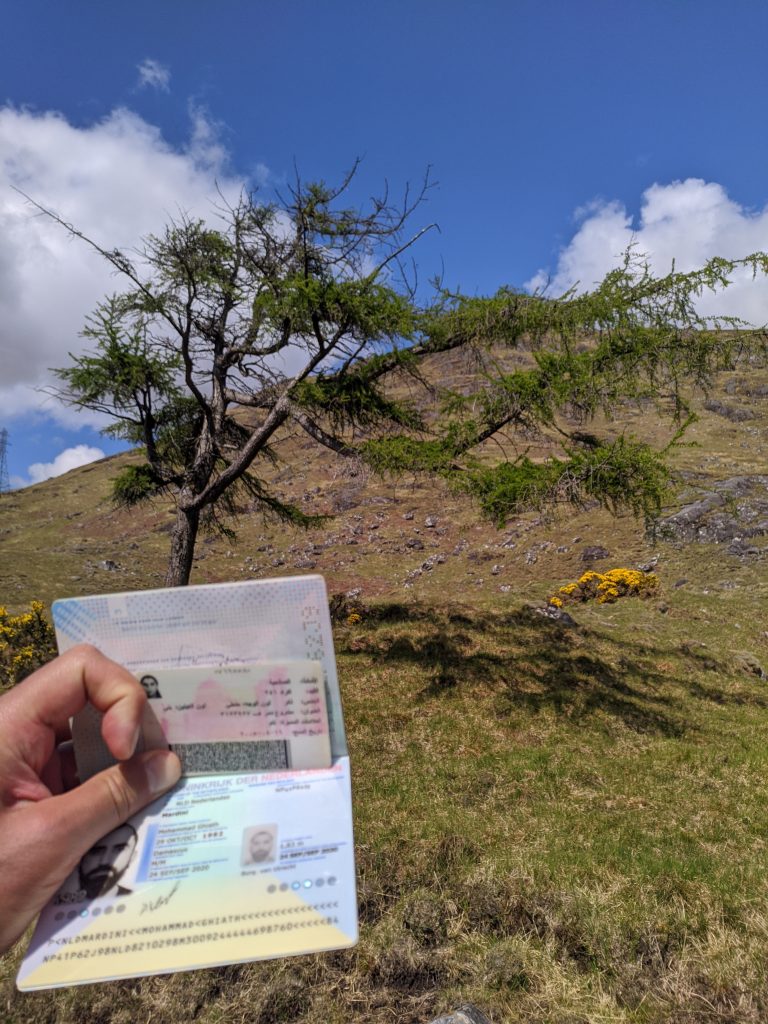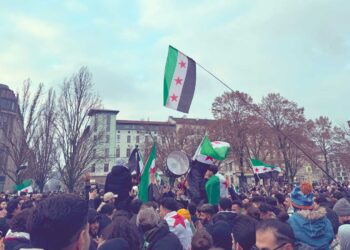Much remains untold when it comes to grief, and much feels unheard as we walk and connect to everything by our side. The dossier “Walking with grief” reflects on the practice of walking through the writing of six artists.
There has always been an inherent urge within me for nomadic life. In my walking pilgrimages, I followed a yearning for solitude or was it a desire for a connection deeper than oneself?
The beginning of my last pilgrimage began in the Scottish Highlands, where I followed an undefined path from the Atlantic Ocean towards the North Sea.
On such journeys one never knows how the path will unfold nor what the body can endure.
Starting my journey by the water’s edge at Mallaig and having the hope to end it by the water again, gave my walking a sense of traversing. It felt like a process of moving myself from one condition to another.
This pilgrimage seemed to allow my past to pass or shift from a state of oblivion to one of remembrance.
With each footstep, different thoughts and wonders started to echo, and as my body got deeper and deeper interwoven with the undulating terrain, relentless flashbacks began simultaneously.
“Memory is inhabited by death”, words from Milan Kundera’s Slowness rose to the surface of my thoughts. “There is a secret bond between slowness and memory, between speed and forgetting”, echoed afterwards.
Walking, I found myself slowing down, contemplating the inseparable link between memory and death. I realized how intertwined those dualities are, each one relies on the other for its meaning. Human understanding grasps forgetfulness through acts of remembrance, just as our comprehension of life is framed by death.
While I was wondering about Milan Kundera’s insight, I caught myself alternating between rushing my steps and easing into a slower gait.
Could my walking rhythm unlock the secret to memory or forgetting? Why do carried memories of the past appear to be past lives? And if they were so, then each of us has had countless deaths and rebirths.
My response to these questions were various memories mixed with a constant interplay of slowing down and speeding up, slowing down again to accelerate once more.
Slowing down …
In a small mountain enclave, high upon Damascus’s Qasioun, I was born for the first time. My first life was the longest, it lasted 28 years. Recollections of that life are but fragments, like my little body cavorting beneath a towering pine.
That yellowish tree stood oddly conspicuous in its segregated neighborhood. Its presence was peculiar in those humble slums like an outlandish guest in their midst.
Each day, like me, passersby paused by its side, offering silent greetings to its trunk, gazing at its bark and wondering how a pine could have thrived in such an unlikely place.
In that space, my secrets were entrusted- like the story of my tears shed during a national civic education class, as I discovered that Syria is a ‘Third World’ country.
Beneath its bough, Maher, for the first time, unveiled to me the mysteries of human intimacy. Later, he exposed me to the complexity of identity politics, introducing the distinctions of being labeled as Kurd, Arab, Sunni, or Alawi.
In that spot, my uncle whispered of life under a dictatorship, and my father, with a cautious voice, repeated a refrain familiar to many: ‘Walls have ears, don’t forget to choose your words carefully.’
My first life was not as long as what my social surroundings expected for me, I died at a young age much like that pine tree, which was arbitrarily severed at the hands of the Syrian regime because it became a refuge to protesters who fervently announced their desire for freedom and equality.
Speeding up…
In Aleppo, I stayed alive for one single day.
Each day of the Syrian revolution there, encapsulated a lifetime. Mere seconds before or after a bombardment or accidental explosion are the determining factor between dying and getting a new life.
Surviving was a luxury beyond reach, and the stark contrasts in every aspect of life manifested vividly in daily encounters. Even the shattering daylight was interrupted suddenly by a full darkness. Life in Aleppo was a relentless journey of extremes.
I came into this life in the very place where my dead body was discovered, beside a burned tree, a victim of the devastating airstrikes carried out by Assad’s air forces. Beside me lay a young child who had sought refuge at the same tree while playing hide and seek. His sister kept counting for the next three days, holding onto the hope that her brother would reappear once more and stop hiding.
Slowing down…
Far away from any land and trees, in the profound depths of water, which does not belong to any nation, where the sea’s resounding waves drown all other sounds, we were born all together in silence. In the moment when all of us decided to jump on the boat, our names vanished in the water and the sea gave all of us a singular identity: ‘Nafar’*.
We only had murmurs to attempt to break the darkness, but the sound of the sea breaking powerfully on the side of the fishing boat carrying us, had no ears to our murmurs.
Seated almost shoulder to shoulder on the floor of the boat were the majority, but the fortunate few like me, who managed to be on the boat a step ahead, were seated on the edge.
Sitting on the edge, looking at the people around, there could have been no tiny room for any other weary soul. The boat seemed like a microcosm, a miniature world teaming with colors, diverse backgrounds, and beliefs, all navigating the expanse of international waters hoping to touch earth again.
The advantage of having a seat on the edge of the boat soon proved illusory, for my feet were entangled amid the crowd, seemingly fused beneath the weight of others’ feet. Every attempt to free them proved futile, as if they had become one with an invisible force, an odd numbness resisting even the slightest shift. In this peculiar sensation, perhaps lies an indescribable feeling, an obscure sense of salvation or near death.
This life only lasted for three hours. We were exactly fifteen on that boat, everyone survived except me. I alone failed to reach the other shore. As the boat’s engine stopped working and everyone jumped into the frigid waters before it capsized, I found myself alone gasping for air, suffocating in a strange silence punctuated by others’ screams. While I was drowning, the last thing I ever heard were voices cursing at God and humanity, and other voices reciting verses from the Quran.

Slowing down…
As the sun almost went off on my day through the Highlands, I was ignoring some initial signs of physical tiredness. But nothing prevented me from ascending a hill that led me to a solitary pine. This tree, slender, weary, and gracefully curved, seemed out of place amidst a landscape dominated by sturdy oaks. Through the years, the wind had swept its form dramatically, a testament to its resilience while standing alone.
Its solitary stance evoked a sense of familiarity, reminiscent of a chapter from my past life, a reminder of being born in isolation, much like this pine.
Walking, I remembered many past lives, but none so vividly as the most recent one that I was given, when an official of the municipality handed me my first Dutch passport declaring me as a Dutch citizen. Her words were more than mere formality: “Hopefully you will forget all death memories afflicted by your homeland, congratulations on your rebirth.”
What if I want to remember? Is there another way of remembering? Or what resides between remembering and forgetting or even between speed and slowness?
Between remembering and forgetting perhaps lies a complex terrain of temporality. A space where memories fade but linger, where fragments of the past stir emotions without full recollection. It’s a bittersweet mixture of longing and belonging but at the same time, a mix of displacement and alienation. It’s a liminal space, where the mind grapples with what it holds onto and what slips away, where movements occur neither too swiftly nor too slowly. It’s the spot where the temporal rhythm of daily life resides, offering a sense of numbness and sensitivity. Between remembering and forgetting dwells a body in exile.
Beside that lone pine’s trunk, I decide to slow down my steps. I had a moment of introspection where I believed as if we were both ghosts hovering between a life in the past and another in the present, torn between holding on to what remains of remembrance or fades into forgetting.
Next to the pine, I admitted my survivor’s guilt of all those previous deaths, and I showed the tree how my body carries an identity that is different from the identity of my memory. One identity got the privilege of unhindered wandering, while the other persists in daily mourning. It grieves for people who don’t have the right of free movement to cross borders, and for places enduring daily injustice and oppression, facing ongoing loss, and overlooked tragedies.
Then, I felt that the tree had sensed my unspoken thoughts, almost responding with whispering unforgettable tales of the ‘The Highland Clearances*’. It was as though its silent presence carried echoes of thousands of people and communities who were displaced forcibly out of their homes and ancestral lands.
At that moment, the only thing I wanted was to hold on remembering and to walk slower and slower and slower.








